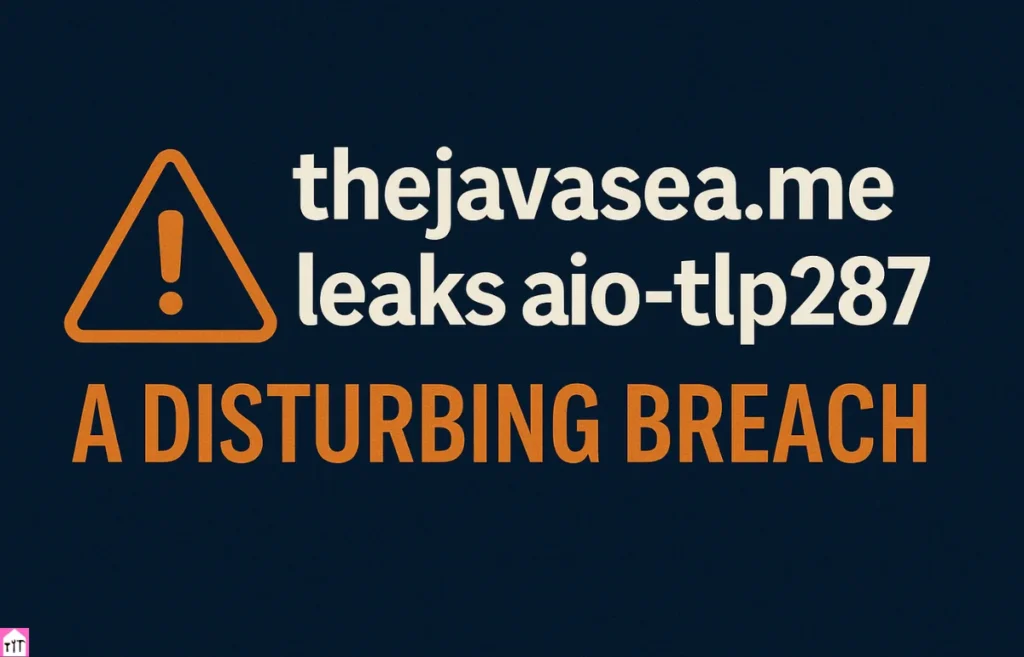
Digital advancements have made private information more susceptible to exposure. Among the rising number of breaches, one recent incident has sparked concern across forums and cybersecurity circles alike: the thejavasea.me leaks aio-tlp287. This breach is not just a minor hiccup—it’s a significant data compromise involving the exposure of sensitive user information like email addresses, passwords, and other private credentials.
But what exactly happened? Who’s affected? And more importantly, how can you protect yourself moving forward? Let’s break it down.
Explaining thejavasea.me Breach and the aio-tlp287 Dataset
Understanding the Site Behind the Leak
thejavasea.me is a lesser-known website that, up until recently, flew under the radar. Initially positioned as a platform hosting niche content and resources, it became infamous for being linked to a major data leak.
What is aio-tlp287?
aio-tlp287 refers to a tagged dataset within hacker communities—essentially a label used to classify specific breach dumps. In this case, it contains a combination of usernames, emails, encrypted (and in some cases, plain-text) passwords, and potentially more identifiable details. It’s commonly traded or shared in deep web forums and breach databases, often without the consent of the original data holders.
Extent and Effects of thejavasea.me Breach
The thejavasea.me leaks aio-tlp287 isn’t just another case of user data getting exposed. What sets it apart is the scale and variety of information that was leaked.
Table: Snapshot of Leaked Data Categories
| Type of Information | Description | Potential Risk |
|---|---|---|
| Email addresses | Personal and business emails | Spam, phishing attacks |
| Passwords | Some encrypted, others in plain text | Account takeover, credential stuffing |
| IP addresses | Logged login attempts | Location-based targeting |
| Usernames | Often reused across platforms | Identity profiling |
| Site metadata | Logs from website activity | Behavioral profiling |
As seen above, the type of data exposed can cause serious harm, not just to individuals, but also to companies that rely on user trust.
Who’s Affected by the thejavasea.me Leak?
Individual Users
If you’ve interacted with thejavasea.me or registered an account, your information could be at risk. Even if your password was encrypted, weak encryption algorithms can be cracked using modern brute-force tools.
Businesses and Organizations
The breach also impacts any affiliated organizations or third parties whose services were embedded or linked through the platform. If your brand or product had any partnership or cross-functionality with thejavasea.me, you’re now exposed to reputational damage and potential legal liability.
Legal Implications: Can Someone Be Held Responsible?
Data Protection Laws Apply
Depending on the geographical region of users, the site or its owners may be in violation of GDPR (Europe), CCPA (California), or PDPB (India). These data protection laws require websites to follow strict protocols for storing and managing user data.
Could Legal Action Be Taken?
Absolutely. If negligence or mishandling of sensitive data is proven, class-action lawsuits or regulatory penalties may follow. Victims may also have the right to pursue compensation depending on local jurisdiction.
Citation: European Union Agency for Cybersecurity (ENISA) reports show that data breaches involving personal data are increasing at over 20% per year. (ENISA Threat Landscape 2023)
How to Check If You’re Affected
These tips can help you determine if your data was compromised and what to do next.
Use a Data Breach Checker
Websites like HaveIBeenPwned.com allow users to input their email and see if it’s part of known breaches, including thejavasea.me leaks aio-tlp287.
Scan Your Accounts for Unusual Activity
Look for:
Login alerts from unknown IPs
Password reset attempts
Messages you didn’t send
Set Up Credit Monitoring
If your leaked data includes sensitive financial info (bank emails or credentials), consider using tools like Credit Karma or LifeLock to monitor suspicious credit activity.
Steps to Take After thejavasea.me leaks aio-tlp287
1. Immediately Change Passwords
Update your passwords on all platforms, especially if you reuse them. Use unique, complex combinations and avoid patterns. A good password manager (e.g., Bitwarden, 1Password) can help.
2. Enable Two-Factor Authentication (2FA)
Even if a hacker has your password, 2FA creates a strong second barrier. Use authenticator apps like Google Authenticator or Authy over SMS-based codes for better security.
3. Revoke Unauthorized Sessions
Most platforms show logged-in devices or sessions. Sign out of all devices and start fresh.
4. Monitor Emails and Bank Accounts
Beware of phishing emails that look legitimate. Never click suspicious links or give out personal information over email.
Best Practices to Prevent Future Data Leaks
The lesson from the thejavasea.me leaks aio-tlp287 is clear: prevention is better than damage control.
Use Strong Password Policies
Avoid using the same password across sites. Change passwords every few months.
Be Skeptical of Unknown Sites
Before entering your data, check for HTTPS, look up the domain on WHOIS databases, and check its presence on reputation trackers like Web of Trust (WOT).
Avoid Public Wi-Fi for Sensitive Tasks
Always use a VPN when accessing banking or personal accounts on public networks.
Keep Software Updated
Unpatched software is a hacker’s best friend. Enable automatic updates on your browser, OS, and antivirus programs.
FAQs about thejavasea.me leaks aio-tlp287
1. How do I know if my data was part of the thejavasea.me leaks aio-tlp287?
You can use websites like HaveIBeenPwned.com to check if your email or username was compromised in known breaches.
2. What kind of data was leaked?
The leak exposed emails, passwords (some unencrypted), IP addresses, and user activity logs.
3. Am I entitled to take legal steps if my information was compromised?
Yes, depending on your region’s data protection laws. Consult a digital privacy attorney to explore your options.
4. Should I delete accounts associated with thejavasea.me?
If possible, yes. Also, revoke access permissions if you linked the site with any third-party platforms like Google or Facebook.
5. Has the platform addressed its security concerns?
No. Until further transparency is shown and security measures are confirmed, avoid using thejavasea.me or similar unverified platforms.
Final Thoughts: Why This Breach Matters
The thejavasea.me leaks aio-tlp287 isn’t just another data breach headline—it’s a wake-up call for every internet user. Whether you’re a casual browser, a small business owner, or an IT professional, data hygiene is no longer optional.
Don’t wait for your name to show up in the next breach list.
Change your habits, stay vigilant, and treat your data like the asset it truly is.
If you found this article helpful, consider sharing it with someone who needs a reminder about cybersecurity basics. Stay safe, and stay informed.
